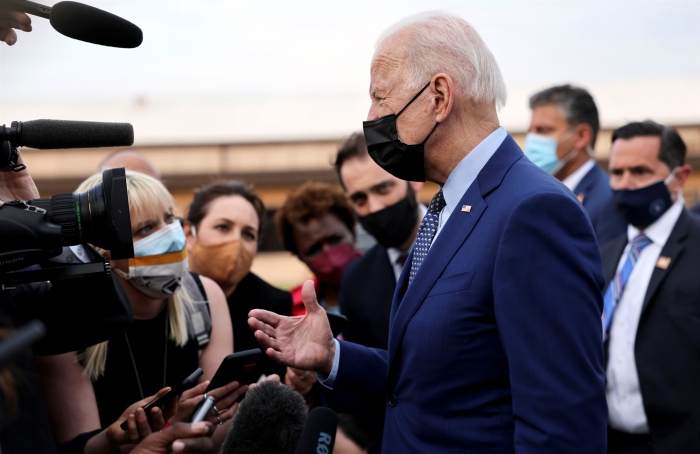Biden pursues GOP infrastructure deal as anxious Democrats watch the clock

As President Joe Biden doubles down on seeking Republican cooperation for an infrastructure package, some Democratic allies say he should be prepared to go it alone if a deal doesn't materialize quickly.
As President Joe Biden doubles down on seeking Republican cooperation for an infrastructure package, some Democratic allies say he should be prepared to go it alone if a deal doesn't materialize quickly.
The White House wants to see counteroffers to Biden's $2.25 trillion infrastructure plan by the middle of this month, and if progress isn't being made by Memorial Day, officials will reassess their strategy of trying to build bipartisan support, said a person familiar with the negotiations.
Some moderate Democrats insist on cutting a deal — and others worry that it would be a dead end that would burn valuable time.
Republicans, who have floated a slimmer $568 billion package, say they wonder whether the White House is willing to limit a bill to narrower measures, like roads and bridges, while cutting out pieces they oppose, like elder care subsidies. Aides for members of Congress on both sides of the aisle also say they fear that the other side may not be negotiating in good faith.
If Democrats unify behind a proposal, they could use a budget process to pass legislation through the Senate without Republican support, as they did with the $1.9 trillion Covid-19 relief package. But for now, they lack consensus to go that route. And with razor-thin majorities in both chambers, they can't have any defections.
Biden spoke Thursday by phone with Sen. Shelley Moore Capito, R-W. Va., who is playing point for her party on infrastructure. Both later sounded upbeat; Capito said it was a "constructive" discussion, and Biden described it as a "good conversation" and invited her to the White House.
"Let's decide what are they prepared to consider in terms of what constitutes infrastructure, how much of it, and then we can talk about how to pay for it if we get to the point that we actually have a real number," Biden told reporters after the call. "If it's like last time — and I don't, I think she's serious — but if, like last time, they come in with one-fourth or one-fifth of what I'm asking and say, 'That's a final offer,' then it's a no-go for me."
White House chief of staff Ron Klain said Sunday that Capito and several other Republicans would be invited to the White House this week.
Sen. Bill Cassidy, R-La., a member of the Finance Committee, said he doubted that Democrats would be willing to compromise — unless they are forced to.
"Do they have the votes? If they don't have the votes, they're serious about bipartisanship. If they have the votes, they're not serious about bipartisanship," he said. "That's my presumption."
Behind the scenes, Biden and senior administration officials have been meeting with lawmakers. The efforts are expected to ratchet up this week, White House officials have said. The White House has already held at least 415 phone calls or meetings with members of Congress, congressional chiefs of staff and staff directors from both parties, an official said. They have completed at least two dozen Senate and House committee staff-level briefings that were bipartisan or Republican-only.
When it comes to dealing with members of Congress directly, Biden's Cabinet members responsible for helping pass the bill have called at least 62 Republican and Democratic members of Congress, and senior administration officials have met with 10 senators in both parties, the official said. Klain and Steve Ricchetti, the counselor to the president, have met recently with moderate Democrats to build support, including the Blue Dog and Problem Solvers caucuses.
Biden will meet on May 12 with the top Republican and Democratic leaders from the House and the Senate.
People familiar with the talks said that Republicans will have a limited window to reach a deal and that May is a crucial month to gauge the prospects. A person close to the White House said officials are wary of getting drawn into never-ending negotiations that turn out to be fruitless, an experience during the Obama administration that the White House is determined not to repeat.
There is a sense of urgency among Biden and his allies, who feel they have a limited window to pass any legislation before members start focusing on the midterm elections, in which Democrats could lose one or both chambers of Congress.
"I think this month is where we're going to see whether Republicans are actually willing to work together on tough issues," Sen. Chris Coons, D-Del., said in an interview.
Sen. Joe Manchin of West Virginia, a key swing vote, is among the Democrats who aren't ready to go it alone. He cited the recent 94-1 Senate vote on a bill to tackle hate crimes against Asian Americans as a model for cooperation.
"Give them a chance," he said. "I was very pleased with how that happened."
But some top Democrats say they need to see results soon.
"It has to be a timely discussion. We can't waste a lot of time," said Senate Majority Whip Dick Durbin, D-Ill.
Asked whether Memorial Day could be a pivot point, Durbin said, "I'd hate to announce a deadline."
The No. 3 Senate Democrat, Patty Murray of Washington, echoed the sentiment late last week.
"If they say, 'We're not going to help you,' then we will have to go down the path of reconciliation," Murray said. "But I think the country wants us to act."
Senate Finance Chair Ron Wyden, D-Ore., a key player in the negotiations, said he will "do everything I can to try to find common ground," but he sounded a note of skepticism about "the Republican assertion that multinational corporations — the biggest of the big, where corporate revenues are down 40 percent in recent years — should not pay a penny for infrastructure."
"Pretty hard to make anything bipartisan out of that," he said.
Biden, who has called for raising taxes on corporations and households earning above $400,000, also rejected the GOP opposition to tax increases to help finance it. "That's back to the old Republican position of cut taxes $2 trillion, go into debt and not pay," he said. "I mean, it's ironic how this has all changed."
Sen. Joni Ernst of Iowa, a member of the Republican leadership team, said she is "a little skeptical" about the White House's outreach after it opted to pass the Covid-19 relief bill without Republican votes.
"But he said it on national television, and I hope that he is sincere about working with Republicans on infrastructure, because I really do think we can get something done," she said.
Sen. Bernie Sanders, I-Vt., the chair of the Budget Committee, who would oversee the budget reconciliation process, said his "assumption is that the Republicans are not serious about a major infrastructure bill which would include significant funding for infrastructure, for climate change, for affordable housing and certainly for human infrastructure, as well."
"Should we spend an endless amount of time negotiating with Republicans? The answer is absolutely not. We have seen this movie before," he said. "If Republicans are serious and want to address the major crises facing this country, that's great. If not, that's fine. We go forward alone."
The White House believes it is negotiating from a position of strength, pointing to favorable polling: A Monmouth University survey, for instance, found that 68 percent of U.S. adults supported the infrastructure plan, including 32 percent of Republicans, with 29 percent of the country opposing it.
"The president has always been clear that he believes that we should be able to craft policies that Democrats and Republicans can agree upon. And that's what he as president is going to try to do," said White House senior adviser Anita Dunn. "But he also has been clear that he was elected to deliver for the American people. He's going to try to work with the Republicans," she said, and "is realistic about their view, and he understands their politics."
The Rocket and Artillery formations of the Azerbaijan Army conduct live-fire exercises in accordance with the combat training plan for 2021, the Ministry of Defense of Azerbaijan told Baku Tribune.
LAST NEWS






.jpg&h=67&w=67&zc=1&q=100)













